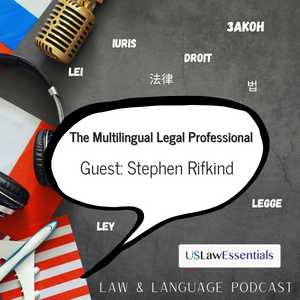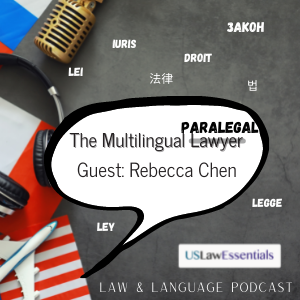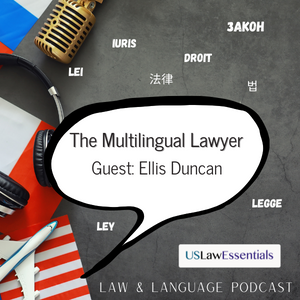Speaker 0 00:00:00 It just, it just isn't plausible, but at least I can dream.
Speaker 1 00:00:02 Yeah. And while you dream, I'll go get, uh, Dr. Lee who's a psychiatrist, and maybe she can help interpret some of these, these, uh, dreams. You're having
Speaker 2 00:00:16 The Honor Court of the United States with money to draw and
Speaker 0 00:00:21 Give. Welcome to the US Law Central's Law and Language Podcast, the legal English podcast for non-native English speakers that helps you improve your English listening, improve your legal English vocabulary, and build your knowledge of American legal culture. Hi, this is Daniel. And before we begin today's episode, I wanna remind you that US Law Centrals offers online courses in legal, English and online courses in US law. Our courses are designed for international attorneys, students, translators, and bar candidates. If you have any questions, please contact Daniel
[email protected]. Also, please visit
[email protected] and join us on Facebook and LinkedIn. And now, today's episode,
Speaker 1 00:01:15 Welcome to the US Law Essentials Law and Language Podcast. I'm Stephen Horowitz.
Speaker 0 00:01:21 And I'm Daniel Edson.
Speaker 1 00:01:23 And today we're doing another episode in the What's New in the Legal News Series. And today it's Dan's turn to pick something. What do you got, Dan?
Speaker 0 00:01:35 Okay, so I have an article from the Daily Pennsylvanian, and the headline is, Former Yale professor will appeal dismissed lawsuit claiming Yale fired her over Trump
Speaker 1 00:01:52 Tweeting. Oh, there's a lot going on there. So a former Yale professor,
Speaker 0 00:01:57 Right. And she's a psychiatrist, and her name is Dr. Bandi
Speaker 1 00:02:03 Lee. Okay. And she tweeted something about Trump at some point,
Speaker 0 00:02:09 Right.
Speaker 1 00:02:11 And, and then there was a, a lawsuit,
Speaker 0 00:02:15 Right, because she got fired or she wasn't reappointed to her position by Yale University.
Speaker 1 00:02:22 So then they, the, the court dismissed the lawsuit,
Speaker 0 00:02:28 Right? She sued Yale and the, the, the trial court, which is a district, a federal district court in Connecticut, dismissed her lawsuit. And so now, according to this article, she plans to appeal,
Speaker 1 00:02:44 Wait, if they dismissed her lawsuit, does that mean, was there even a trial?
Speaker 0 00:02:49 There was no trial. That means that this case ended right at the beginning. So she filed her complaint, made her allegations, and the court looked at the complaint and said, Forget it, you're done. We're throwing out this case. The case is dismissed.
Speaker 1 00:03:08 And yet, according to the headline, she's going to a appeal that decision to dismiss the case.
Speaker 0 00:03:15 Right. So she's gonna have to try to argue that the trial court judge made some sort of legal error in the decision to dismiss her complaint.
Speaker 1 00:03:27 So in this case, the, the judge dismissed the lawsuit. Um, don't, don't, don't we have a right to, uh, a jury trial in America, as in America, all about the trial by jury.
Speaker 0 00:03:40 Yeah. And if you watch TV shows or movies, you'd think that every case gets to go to a trial. But in a civil litigation, if the defendant can show that the plaintiff's complaint is meritless, then the judge can dismiss the complaint. So we don't have to go through the whole process of dealing with a frivolous lawsuit.
Speaker 1 00:04:08 Ah, So like if you said, Steven, I'm gonna sue you because I don't like your haircut. And I said, What, what the heck, What are you talking about, Dan? So then, but you, but you file something with the court, and now there's a, a, a case that's starting. I can file a motion with the court and ask the court to dismiss the case because it's frivolous or silly or a waste of time, and there's no merit to the claim.
Speaker 0 00:04:34 Steve, I'm very hurt that you think that my lawsuit against you and your hairstyle is frivolous. But I think in this case you might be right, <laugh>, you would probably have a very strong argument that my case is frivolous. I mean, that doesn't mean I'm not gonna try, but I think you, I think you would have a pretty good argument that that would be frivolous. Oh,
Speaker 1 00:04:55 Okay. So, so, so, so this, uh, the ability to just to file a motion to dismiss helps prevent a lot of bad lawsuits and, and abuse of the court system that might otherwise exist.
Speaker 0 00:05:10 Right? Well, I guess the defendants would say that it prevents bad or frivolous lawsuits. Plaintiffs might look at it differently, and I'm sure the plaintiff, Dr. Lee, in this case, looks at it differently. But Steve, do you know when a court will decide that a complaint should be dismissed because it lacks merit
Speaker 1 00:05:33 When, uh, uh, when, I don't know, 12 o'clock, two o'clock
Speaker 0 00:05:41 <laugh>? Well, I actually, I don't know the, the precise time. What I meant is, do you know the standard,
Speaker 1 00:05:47 Oh, no. What is the standard? Dan,
Speaker 0 00:05:50 The Supreme Court said that complaints should be dismissed if they lack plausible allegations showing that the plaintiff is entitled to relief to a remedy.
Speaker 1 00:06:07 Plausible. And what was that other fancy word you used?
Speaker 0 00:06:12 Uh, all my words are fancy, Steve, but it has to be the, the court will dismiss a complaint if there's no plausible allegations showing that the plaintiff is entitled to relief to a remedy. So
Speaker 1 00:06:29 Plausible, plausible and allegation both sound pretty fancy to me.
Speaker 0 00:06:34 Oh, well, thank you. So the allegation is like the accusations and the complaint, the plaintiff puts in allegations in each paragraph saying, This is why the court should award me monies. So those are the allegations.
Speaker 1 00:06:49 So, so an allegation is like a claim. Like I say that this is what happened. We don't know yet if it's true because it hasn't been discussed in court yet. But this is what I say.
Speaker 0 00:07:01 Right? Right. So that's an allegation. So I'm saying this is true, and if what I say is true and I prove it, I should get money from the court. Okay. Or from the defendant.
Speaker 1 00:07:11 And now a plausible allegation.
Speaker 0 00:07:15 Yeah. So the courts will dismiss a complaint if those allegations aren't plausible. And now, Steve, now's the moment when you get to explain the word plausible.
Speaker 1 00:07:31 Well, let's see. Plausible. I think that makes the word allegation a little more subjective, right? There's, there's some standard that has to determine whether this allegation is enough, whether not just whether it's possible, but whether it's kind of more likely to be possible.
Speaker 0 00:07:53 Yeah, that's exactly it. So it's not just, it's not just enough that maybe there's some possible chance that the plaintiff will be able to prove something, that'll show that the plaintiff deserves some sort of award from the court. Instead, there has to be something in the complaint that would make the plaintiff's claim a little bit more than merely possible. It has to be plausible. And in this case, the plaintiff couldn't do it.
Speaker 1 00:08:25 Right. A lot of things are possible. It's possible that I can win the lottery. Is it plausible that I'm gonna win the lottery?
Speaker 0 00:08:33 I hope so, because, you know, because you know, we, we have a deal that if you win the lottery, I get 80%.
Speaker 1 00:08:40 That's not possible. <laugh>.
Speaker 0 00:08:43 Ok. But well, in, in a way, that's sort of what happened in this case. The plaintiff said, All right, I tweeted some things that expressed my political opinion. And those things that she tweeted dealt with her essentially saying that president, former President Trump and his lawyers might not have very good mental, mental health. And, and so she tweeted those things. And Yale basically said, You know, you shouldn't be tweeting this as a doctor when you haven't examined these people. And she said, Well, you fired me because of my political opinions, and we had a contract, and the contract said, You won't fire me just because I happen to ha just because I happen to express these political opinions.
Speaker 1 00:09:41 And Well, is there a contract?
Speaker 0 00:09:44 Well, that's what she said. She alleged it in the complaint. She said, Well, there's this employee handbook, there's the things that you said, the things that Yale University did. And she said, You put it all together and there is a contract,
Speaker 1 00:10:02 But there's not like a contract that says contract at the top, and then there's like some words, and then both parties sign it together. Nothing, nothing that black and white.
Speaker 0 00:10:12 Right? So it wasn't as clear as all that, but she said, Hey, if you, if you accept what I'm saying in the complaint as true, you put it all together and then there's a contract. Yale University, you broke the contract and that was her case. And then came the motion to dismiss.
Speaker 1 00:10:33 And so the motion to dismiss basically was saying there's no provision in any contract or any contractual relationship that exists between, between, uh, Professor Lee and Yale University. There's no provision that says anything anywhere about firing somebody for making a political statement about whether that's okay or not. Okay?
Speaker 0 00:11:04 Yeah, that's exactly right. So Yale University said, Okay, maybe we didn't give you your position back on our faculty with Yale University, and maybe we did it because of the things that you said, but there's nothing in any contract that says we won't do that. So even if it's, even if we did this because of what you said, we were allowed to, there's no contract that said we couldn't do it.
Speaker 1 00:11:33 Right? So even if all the facts of what she said are true, there's still nothing there that makes a plausible allegation that, that Yale University violated whatever contractual relationship there was.
Speaker 0 00:11:50 Right? The court said, even if we accept all these allegations, we still don't have to accept that there was any contract that said that Yale University can't fire you for your political statements, and nothing in your complaint shows that there was such a, such a contract. And the court dismissed the complaint.
Speaker 1 00:12:12 Okay, Dan? So, so then by, by that thinking, you don't get 80% of what I might win in the lottery, because there was never any contract. We never had a contract. And if we did, I wouldn't have put that in the contract.
Speaker 0 00:12:29 Oh, wait, but wait, Steve, I'm not sure I heard you. Can you say that again? You said 80%. Just say that part again.
Speaker 1 00:12:36 I said that 80% goes to you.
Speaker 0 00:12:40 Perfect. Okay, now we have a contract. So now it's plausible that I can allege that you owe me 80% of whatever you win when you win the lottery. So go up. So go, go play the lottery, Steve. Uh, I'm really cheering for you this
Speaker 1 00:12:51 Time. Wait a second. That's outta context. Wait. This is all, this is so implausible.
Speaker 0 00:12:56 Thanks everyone for listening to the US Los Angeles's Long Language podcast. We have to go now, <laugh>.
Speaker 1 00:13:00 Wait a second. I'm gonna call my lawyer.
Speaker 0 00:13:04 All right. Well, you're right, Steve. It just, it just, it just is implausible, but at least I can dream.
Speaker 1 00:13:10 Yeah. And while you dream, I'll go get, uh, Dr. Lee who's a psychiatrist, and maybe she can help interpret some of these, these, uh, dreams you're having.
Speaker 0 00:13:19 Yeah, I'm not so sure I'm comfortable with that, especially because she might just decide to, uh, diagnose me by, by tweeting. But anyway, maybe she'll listen to this podcast and she'll diagnose us.
Speaker 1 00:13:32 I, I think that would be quite essential for her.
Speaker 0 00:13:35 It would be essential for us. And Steve, I hope that you, uh, stay essential.
Speaker 1 00:13:38 Stay essential, Dan.


